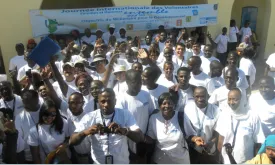On 30 April 2011, MINURCATs Liquidation Phase, begun in January 2011, will end, and its team of national and international staff, which includes 50 UN Volunteers, will be disbanded.
On 31 December 2010, in accordance with Security Council resolution 1923 (2010) and at the request of the Chadian Government, the UN Mission in Central African Republic and Chad (MINURCAT) completed its mandate. On 30 April 2011, MINURCATs Liquidation Phase, which started in January 2011, draws to a close and its team of national and international staff, which includes 50 UN Volunteers, will be disbanded. MINURCAT was established by Security Council resolution 1778 (2007) on 25 September 2007 in order to help protect civilians, promote human rights and the rule of law, and promote regional peace. Experts in the technical and administrative areas were deployed to start up the duty stations. In January 2008, the first UN Volunteer joined the MINURCAT team, and by the end of that year, 98 UN Volunteers were on board in the two duty stations of NDjamena and Abeche. They faced challenges related to security issues, team building and the need for a better awareness of volunteerism, often working closely with the UN Volunteers already in Chad serving other UN Agencies. In 2009, the United Nations Volunteers (UNV) programme presence in Chad expanded. By December, 186 UN Volunteers were assigned to MINURCAT where they contributed to peace and development in NDjamena and Abeche, and across Eastern Chad in remote duty stations such as Goz Beida, Farchana, Koukou, Iriba and Guereda. Four UN Volunteers were even deployed to Birao in the Central African Republic. These postings presented security and logistical challenges to the UNV Field Unit related to the rapid recruitment and deployment of UN Volunteers to remote duty stations. The year 2010 brought the end of MINURCATs mandate and the consolidation of its achievements. Together, UN personnel increased their efforts to meet tight deadlines under very difficult working conditions. Reporting to the Security Council in December 2010, the Secretary-General said MINURCAT has been an unusual and unique United Nations peacekeeping operation in that it was devoted solely to contributing to the protection of civilians, without an explicit political mandate. It has gone through the stages of planning, deployment and withdrawal in the short span of less than four years, enduring adversities in each. Throughout the missions presence, its duty stations experienced a variety of security phases. Eastern Chad experienced an ongoing level 4 "Emergency operation", while N'Djamena experienced its most difficult period in 2008. That year, its security phase was raised from the level 3 Relocation phase through to level 5, Evacuation, when the city came under attack. The contribution of UN Volunteers in the technical, administrative and substantive areas was critical to the missions continued and successful operation even under these tough conditions. During its mandate, UN Volunteers in Chad made an impact inside and outside MINURCAT. They provided capacity building workshops to local NGOs and public health campaigns in NDjamena. They rehabilitated schools in Abeche and Iriba, conducted environmental campaigns and celebrated the yearly International Volunteer Day. Also, UNV in Chad engaged in partnerships with Airtel as part of Airtels Corporate Social Responsibility Strategy and UNVs mandate to promote volunteerism. The Chadian Government has pledged full responsibility for protecting civilians on its territory. In October 2010, a team from UNV headquarters in Germany held brief individual meetings with 148 UN Volunteers serving in MINURCAT as well as interested local volunteers, to get their feedback on their experience with MINURCAT and record their interest in serving as UN Volunteers in future. Chad is the site of one of the UNs largest humanitarian operations. While the MINURCAT UN Volunteers are leaving the country, more than 70 UN Volunteers will remain. They will continue to serve UNHCR (United Nations High Commissioner for Refugees), UNDP (United Nations Development Programme), UNFPA (United Nations Population Fund), WFP (World Food Programme) and the Global Fund against HIV/AIDS, Malaria and Tuberculosis. So doing, they will continue to support the Chadian population and the Government of Chad with the remaining recovery, development and humanitarian challenges. German Robles Osuna (Mexico) served as a UNV Project & Advocacy Officer with MINURCAT from 1 May 2010 to 31 March 2011. For more on his experiences during the closing phase read

